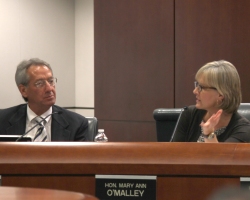Council Changes How to Allocate 50 New Judgeships
Contact: <a href="mailto:teresa.ruano@jud.ca.gov">Teresa Ruano</a>, 415-865-7740
December 13, 2013
Judicial Council Changes How It Will Allocate 50 New Judgeships Once Funded
Most recent needs assessment will determine which courts get new judgeships

SAN FRANCISCO—At its public meeting on December 12-13, the Judicial Council approved a change to how it will allocate the next 50 judgeships to the trial courts once funding is approved for them in the state budget.
The judgeships in question are commonly referred to as the “second 50” judgeships that were authorized, but not funded, through Assembly Bill 159 (Stats. 2007, ch. 722), and based on a judicial needs assessment approved by the council in 2007. A report submitted to the council for its consideration today showed that the most recent needs assessment, prepared and approved by the council in 2012, would change the allocation of judgeships compared to what the council approved in 2007.
“As much as my court would love one [a new judgeship], we have to look at the needs of our courts statewide,” said council member and Contra Costa County Judge Mary Ann O’Malley. Contra Costa County would have gained a new judgeship if the council based its allocation on the judgeship needs of 2007, but will not get one based on the updated 2012 needs assessment. “For those of us who must go back to our courts that were getting judges and now may not be, it’s not the easy thing to do, but it’s the right thing to do.”
The council voted to allocate the 50 new judgeships, and any additional judgeships approved and funded in the future, based on the most recent judicial needs assessment approved by the Judicial Council.
Listen to audio (36:26)
Other actions and discussions that took place at the council meeting:
2014 Legislative Priorities: The council approved legislative priorities for the judicial branch in 2014. Recommended by the council’s Policy Coordination and Liaison Committee, the legislative priorities include: (1) Advocating for a robust reinvestment in our justice system to avoid further reductions and to preserve access to justice for all Californians; (2) Advocating to secure new judgeships and ratify the authority of the council to convert vacant subordinate judicial officer positions to judgeships in eligible courts; and (3) Advocating for legislation that will expand access to interpreters in civil cases. Listen to audio (13:11)
Status Report from the Technology Planning Task Force: The task force updated the council on its plan to define judicial branch technology governance; develop a strategic plan for technology at the Supreme Court, Court of Appeal, and trial court levels; and develop recommendations for funding judicial branch technology. The task force described the extensive collaboration with the courts and other stakeholders that their work has involved. The task force expects to provide another update at the council’s January business meeting, subsequently post the technology plan for public comment, and then resubmit the final proposal for council approval at its June business meeting. Listen to audio (30:52)
Open Meetings Rule for Judicial Council Advisory Body Meetings: The council approved a report, due to the Joint Legislative Budget Committee by January 1, on progress toward development of an open meetings rule for Judicial Council advisory body meetings. The report provided an update on the activities, goals, and timeline related to the drafting and implementation of the open meetings rule. The rule will be posted on December 20 and will remain open for public comment through February 7. Listen to audio (31:39)
New Guidelines for Conducting Cost-Benefit Analyses for AOC Projects: The AOC’s Chief Administrative Officer and director of its Fiscal Services Office presented an informational report on efforts related to the application of a cost-benefit/business case analysis for AOC projects. The report responds to the Judicial Council directives to the AOC stemming from the final report of the Strategic Evaluation Committee (SEC). The new Guidelines for the Administration of Branchwide Projects and Initiatives will become effective January 1, and AOC staff will be trained on the guidelines. Listen to audio (10:52)
Final Report of the Elkins Family Law Implementation Task Force: The council approved a final report from its Elkins Family Law Task Force. Many of the task force’s 200 recommendations have been implemented, including those to better streamline caseflow management and processing in family law cases. But much remains to be done to improve data collection and measurement, ongoing education and training, and expanding self-help services and language assistance. Listen to audio (29:48)
An archived audiocast of the entire meeting broken out by topic will be available on the council meeting webpage early next week.
###
